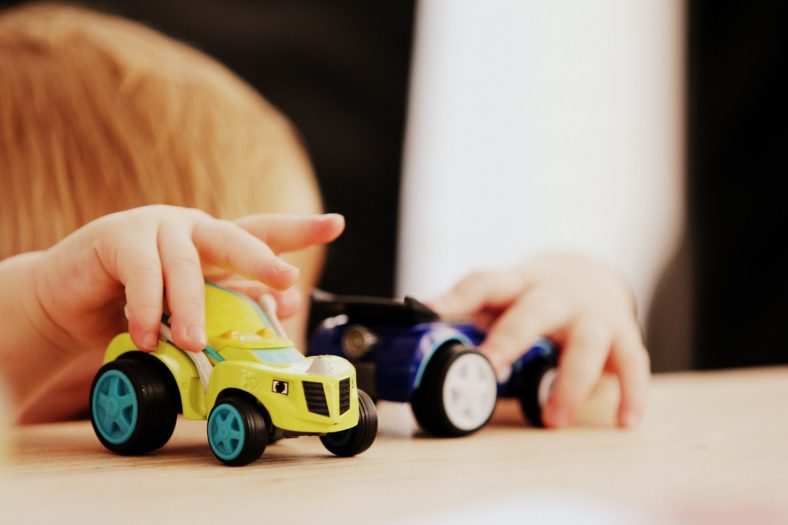Helping your child reach certain developmental milestones is a 24/7 job. A child’s brain continues to form and develop after birth, and will grow to about 90 percent of it’s full size by the time they are five years old. Because of that, it is no wonder parents are kept so busy trying to keep up. The key to fulfilling this growth and development is providing the proper stimulating environment to give your child’s brain something to work with. What better way to invite this rich encouragement than to provide your child with toys that help develop their physical and cognitive skills? The following are some suggestions for toys to purchase that will be both entertaining and educational for your child.
How Is Playtime Developmental?
Child play is the work from infancy into childhood that helps develop the skills needed throughout life. Educational toys are one of the best methods of delivering the means to develop problem-solving skills, to learn the subtleties of conflict resolution, and understand the sequence of cause and effect. What may seem so obvious to adults is brand new and exciting to children as their brains are learning to take on the basics. As children share in playtime, they are also learning to develop essential fine and gross motor skills. Children further benefit from every opportunity to explore their own world of pure imagination.
Mobility Toys
In the first year, babies benefit from mobiles and soothers. Portable play toys that include lights and sounds call on them to focus. Crawl-around zones allow for movement and encourage the desire to strive or reach while also encouraging the physical movement that helps develop strength and the initial stages of balance into their second year. It is through natural curiosity that your child increases their newfound mobility. A soft terrain that presents manageable obstacles provides the movement that helps develop muscles and teaches coordination. Make sure the mobility toys you choose for your toddler are safe and are suitable for their age.
Building Blocks
Building blocks have always offered fundamental developmental play. Building blocks are durable toys that come in many different shapes, sizes, and colors in order to stimulate your child’s mind and imagination. Building with these blocks also helps build your child’s fine and gross motor skills. Additionally, they learn problem solving skills, balance, and basic math and science that can make future lessons easier. When in a group, they learn about sharing, teamwork, and other social skills. You can find a variety of children’s big building blocks online and in toy stores.
Puzzles
When your child has graduated from playing with building blocks, you can introduce them to doing puzzles. Start with simple puzzles with large pieces. After that, you can move to more difficult ones. Puzzles can help your child develop problem-solving skills as they have to determine which pieces go together. Puzzles can also help them improve their memory. Completing puzzles can be a great opportunity for your child to learn how to work with others too. Sit down with your child and work together to complete a puzzle for a bonding experience.
Crafts Can Help Development
As your child gets older, you can also start introducing activities like arts and crafts. These activities can be beneficial for helping cognitive development. For example, purchase some large beads and string for your child to make bracelets with. This will also help them develop fine motor skills by building items with their hands. You can also start purchasing coloring books and crayons as soon as they are able to hold a crayon. This will help them develop creativity. Make sure there is always opportunity for both problem solving and creativity in your child’s playtime. Visit a toy store near you to check out some different craft kits that will be appropriate for your child’s age group and help them explore their creativity early in their life.
More Sophisticated Toys Come with Age
When child development is encouraged by engaging them physically, cognitive learning is promoted. As your child is learning to write, there are toys that help with practicing writing and drawing to develop small motor skills. There are games and books that assist with emergent literacy skills. Learning name recognition, visual versions of what they are hearing, and repetition are all useful tools in associating the sounds in their world with what makes those sounds. A drawing easel, counting toys, “see and say” games or books, and magnetic blocks are all helpful toys that are really learning tools. Make sure the toys you choose for your child are age appropriate and won’t feel too easy or too difficult. You don’t want them to get bored or feel like they aren’t able to keep up with demands.
The variety of play toys that contribute to growth and development help launch a child’s learning even before they reach school age. Building the brain is as essential as building the body. Getting a head start like this is a way to vault a child’s advantage in comprehension and absorption more with each year that they grow. Further, child-guided play will always provide the atmosphere that encourages your child’s sense of self and autonomy. Finally, when your child has the tools to engage in their own explorative play, parents can feel assured they are accomplishing much more than simply being preoccupied; they are actively child developing. Purchase some of the above toy suggestions to help entertain and education your child.

